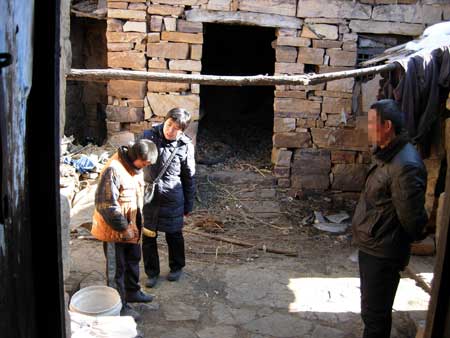Catholics & Communists cooperate to fight AIDS
Salvation workers
Their mission, as the two Wangs see it, is to bring love to chaos.
"No matter how bad the situation is, we listen and help the sufferers," says Sister Wang Aixia, 52.
 |
|
Sister Liu Huanchun, 32, visits Zhang Ruoyu, a 15-year-old AIDS orphan in Xingtai, a prefecture-level city in Hebei Province on December 30 last year. |
"It's a way to witness the love of God."
Their daily work is safeguarding the disadvantaged toward their ultimate salvation, believes her 42-year-old partner Wang Xia.
"AIDS patients are always ignored and discriminated against," she says.
"We become their new eyes, ears and hands."
They were first dispatched to assist the hospital in AIDS prevention and education on September 1, 2007, by the China branch of the Missionary Sisters Servants of the Holy Spirit, a religious missionary community of women disciples.
Their work proved important and rewarding: On September 16, both extended their oral contracts another two years with the program.
The Ditan Hospital program to enroll nuns as volunteers was initiated by Zhang Shijiang, director of Shijiazhuang-based Jinde Charities, in 2003. Zhang had worked in AIDS-stricken areas and realized there was a hidden epidemic.
Established in 1997, Jinde is the mainland's first Catholic social-service center and officially registered as a non-profit organization on April 11, 2006.
Respecting the advice of insiders and experts that "AIDS prevention should involve all sectors of society," the hospital authorities took the bold decision to accept Zhang's proposal.
They offered one extremely important and sensitive proviso: Don't be overtly religious. The nuns are encouraged not to wear their black habits.
"Catholic dress will give patients the impression that the sisters are only helping so they can evangelize," says Wang Kerong, office director of the Beijing Red Ribbon Home.
"But that's strictly banned because it is against the principle of our organization.
"The Beijing Home of Red Ribbon provides understanding and care for sufferers by our professional medical service, psychiatric consultation, behavior intervention, health education and legal aid."
In practice, patients can have a private conversation with the Sisters.
Zhai Linfang, director of the China branch of the Missionary Sisters Servants of the Holy Spirit fully accepts and understands the official proviso.
"Activities of religious organizations are under tight supervision in China," she says.
"We have to convince ourselves that preaching is not the only way to evangelize Catholicism."
Religious activities of religious citizens should, in general, be held at registered sites for religious activities, according to the 2004 Chinese Regulation on Religious Affairs.
To say that Catholics, Communists and AIDS sufferers make unlikely bedfellows is perhaps something of an understatement.
The fact that they could cooperate at all might be more remarkable than recounting their countless teething problems.
The Home of Red Maple has been engaged in AIDS prevention and publicity since May 2002, supervised by the Catholic Social Service Center, Xi'an Diocese.
 0
0 






